I am conscious as I write this message that we are entering National Volunteer Week, which is the annual celebration to acknowledge the generous contribution of our nation’s volunteers. Volunteering is time willingly given for the common good and without financial gain. We have thousands of people who generously serve the church and their local communities. Many of these people will attend the diocesan movie event, to acknowledge and say thank you, at Kotara on Wednesday evening. The diocese has a Volunteer Coordinator, Brodie Clark who has been working with our parishes and agencies to ensure we take care of those who volunteer, while ensuring our observance of the many regulations that now form part of our ongoing compliance.
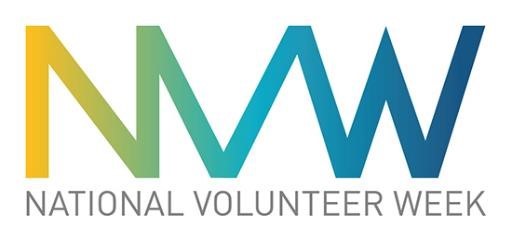
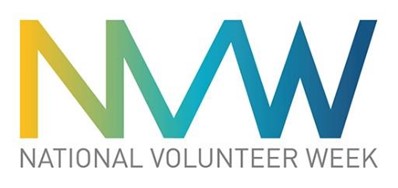 The theme for National Volunteer Week 2019 is Making a world of difference. I believe there are about 6 million Australians who volunteer their time. How much poorer would our nation be without such generosity. I know we struggle, as church, to use the word volunteer to describe those people who share their gifts on behalf of our church, because in many instances those who serve, do so from their relationship with God and their desire to spread the Good News of God’s Kingdom. We are called, and respond as disciples on mission. It is this call and response to discipleship that does make the world of difference. Many of you will be reading this message on Tuesday evening, while Bishop Bill and I will be meeting with the many committed members of the Council for Mission, as we attempt to seek out ways for the Catholic Church, in the Diocese of Maitland-Newcastle, to lead and serve the Church and the wider local community.
The theme for National Volunteer Week 2019 is Making a world of difference. I believe there are about 6 million Australians who volunteer their time. How much poorer would our nation be without such generosity. I know we struggle, as church, to use the word volunteer to describe those people who share their gifts on behalf of our church, because in many instances those who serve, do so from their relationship with God and their desire to spread the Good News of God’s Kingdom. We are called, and respond as disciples on mission. It is this call and response to discipleship that does make the world of difference. Many of you will be reading this message on Tuesday evening, while Bishop Bill and I will be meeting with the many committed members of the Council for Mission, as we attempt to seek out ways for the Catholic Church, in the Diocese of Maitland-Newcastle, to lead and serve the Church and the wider local community.
The notion of people serving the communities in which they live has highlighted for me the death of two significant ‘nonagenarians’ over the past two weeks – Jean Vanier and Bob Hawke. I have no doubt that both men were gifted with the vision to lead and to serve.
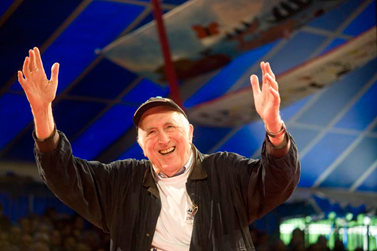 Jean Vanier founded L’Arche in 1964 in the small French village of Trosly-Breuil. L’Arche now supports the lives of people with a disability, the forgotten, the overlooked and the often marginalised, in 154 communities and 21 community projects in 38 countries on 5 continents. I read that, with his passing, ‘the world has lost one of its great spiritual guides.’
Jean Vanier founded L’Arche in 1964 in the small French village of Trosly-Breuil. L’Arche now supports the lives of people with a disability, the forgotten, the overlooked and the often marginalised, in 154 communities and 21 community projects in 38 countries on 5 continents. I read that, with his passing, ‘the world has lost one of its great spiritual guides.’
Canadian born, he served as an officer in England’s Royal Navy and the Royal Canadian Navy. However, he felt called to something deeper and began theological and philosophical studies in the early sixties at Institut Catholique in Paris. After many years of searching, he found his true calling in his 1963 encounter with two young Frenchmen with intellectual disabilities, Raphaël Simi and Philippe Seux. These men's need for companionship and empathy touched his heart when he visited the institution in which they were confined. Vanier realised that the first response of society, when confronted with people with disability, was to shut them away in fear. His response instead was hospitality.
Aside from his work with L’Arche, Vanier shared generously his time and his own reflections on the place of faith and love in the world. As an author of over 30 books, countless articles, and as an internationally renowned speaker, he helped millions come to a deeper understanding of their own humanity and relationship with God.
Fr Justin Glynn SJ wrote the following words about Jean Vanier in Eureka Street on 9 May:
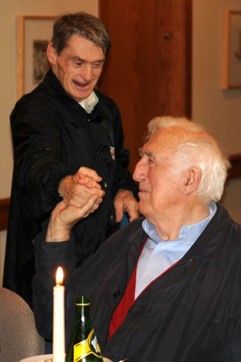
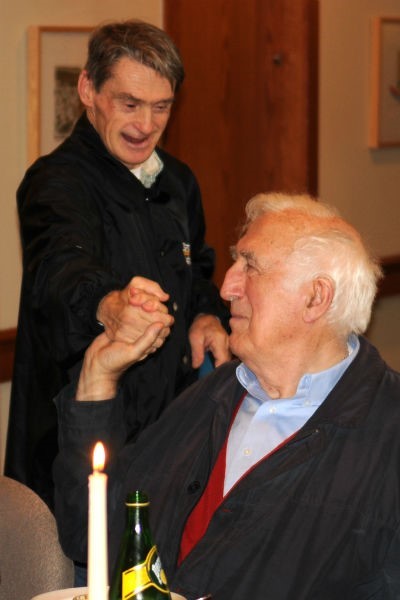 Vanier’s life and his writings show us that the true path to peace is created by living gently with the forgotten, overlooked people of our society, allowing each person to be themselves in their weakness and gifts. In turn, we let ourselves be loved. As Vanier liked to put it: through the sacrament of the poor, therein lies true greatness.
Vanier’s life and his writings show us that the true path to peace is created by living gently with the forgotten, overlooked people of our society, allowing each person to be themselves in their weakness and gifts. In turn, we let ourselves be loved. As Vanier liked to put it: through the sacrament of the poor, therein lies true greatness.
Indeed, Pope Francis phoned Vanier days before his death and thanked him personally for “his witness”. Francis noted, “He was a man who was able to read the Christian call in the mystery of death, of the cross, of illness, the mystery of those who are despised and discarded…" and "… simply put, I want to thank him and thank God for having given us this man with such a great witness”.
Jesuit priest and writer James Martin, summed up Jean Vanier’s legacy beautifully, "He was one of the great saints of our time. Of all the people in our time who minister to people on the margins, I would say he and Mother Teresa were the avatars for Catholics. Jean Vanier showed us the great strength of tenderness and vulnerability and weakness, which is Christ's message."
From my experience of being part of the L’Arche movement, here in Newcastle, and on the NSW Board of L’Arche, Jean Vanier left behind a legacy of how a world free of discrimination might look. And this is where I see a link with the life of Bob Hawke, Australia’s longest serving Labor Prime Minister. As you read this part of my message, I hope you are able to let go of the politics of the person, and see the goodness in his desire to create a better place for humanity. He will be remembered for many things and here are but a few of those: Rhodes Scholar, larrikin, record-breaking beer drinker, reformer, champion of equality and opportunity. He abhorred racism and bigotry, and led the team that gave us Medicare, modernised industry and made the environment a mainstream issue. His Accord brought us together as a nation.
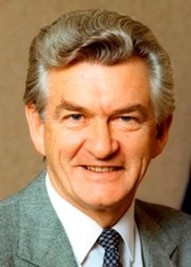 I was touched by the recollections of his mum when he was a baby, in which she sensed he was destined to accomplish something amazing, and then his survival from a motorbike accident from which he said:
I was touched by the recollections of his mum when he was a baby, in which she sensed he was destined to accomplish something amazing, and then his survival from a motorbike accident from which he said:
God had spared my life and….I had an obligation now to make sure that I made the very most of it. And that meant pushing myself to the limits.
There were times in his tenure as Prime Minister that demonstrated his desire for humanity to be better, such as the tears that flowed freely when he read a recount of the Tiananmen Square massacre in 1989 and his decision to allow Chinese students to remain permanently in Australia. He believed in the art of negotiating, collaborating and resolving conflict. The image that remains is of a man who worked hard and played hard. He wanted the world to be a better place and he had a part to play in bringing that about.
Here are some of Jean’s insights, which I believe are worth contemplating in light of both men and our expectation of what ethical and strong leadership means:
All of us begin life incapacitated — unable to speak or see or reason — and most of us, if we are lucky to live so long, will leave it that way: with mental or physical limitations. Limitation and disability is accordingly not something foreign, to be feared or locked away but is in fact an essential part of the human condition.
When we start helping the weak and the poor to rise everyone will begin to change. Those who have power and riches will start to become more humble, and those who are rising up will leave behind their need to be victims, their need to be angry or depressed ... This is the spirituality of life, that helps people to rise up and take their place. It is not a spirituality of death. Jesus wants those who have been crushed to rise up and those who have power to discover that there is another road, a road of sharing and compassion.
The fact is, as Vanier recognised, that all of us are partial, incomplete beings. His '5 Principles of Humanity' include:
- the sacredness of all people,
- the constant evolution of people,
- the corollary realisation that maturity comes in working with others,
- the need for people to make choices for the benefit of themselves and others and
- the universal search for meaning.
I apologise for the length of this message, but we have much to ponder when people who have given so much and so generously go home to be with their creator. As we heard in our Gospel reading (John 13:31-35) over the weekend:
I give you a new commandment:
love one another;
just as I have loved you,
you also must love one another.
By this love, you have for one another;
everyone will know that you are my disciples.